Is There Anything Wrong with Writing 500 Word Blog Posts?

I'm a proponent of longer blog posts, as you can probably tell from both my blog and from the blog posts my company produces for others. I believe that longer posts range better, perform better, and are better received by audiences. I'm not the only one.
The History of 500 Words
You might be wondering why 500 words are the go-to length for so many people. The answer, like it is with many SEO standards, is "it was just enough."
Years ago, before Google's content marketing updates Panda and Penguin, marketers could put whatever they wanted on a page. They would often simply copy other content, either legitimately (by copying product descriptions from manufacturers) or illegitimately (by copying website content from their competitors.) This led to search results that were frequently page after page of, essentially, the same thing on different domains. Very few websites were creating unique content because they didn't need to.
It's as if Google listened to the people and thought "hey, it turns out these mini-pages aren't very comprehensive or useful". When users have to page through four or five sets of results just to find more than one or two unique pages, something is wrong. Those users certainly aren't satisfied, and why bother having duplicate content anyways?
Panda, the algorithmic update from 2011, was the primary driving force that killed off duplicate content and thin content. It's where the 500-word minimum sprang up, and why it has stuck around for so long.

See, anything less than 500 words doesn't have much time to dig into a subject. For reference, this article you're reading right now, as of this sentence, is 277 words. That's over half of what a 500-word post contains, and I've barely even skimmed the surface of this topic.
If you cut out the fluff, if you cut out context, if you take a question and you answer it with no further information, then sure, you can write a blog post in 500 words. But why 500, and not 400, or 600? There are three primary reasons:
- It's a nice round number. 500 is half of 1000 and it's easy to parse. People like numbers that are nice and pleasing.
- It's an easy "unit price" for content mills. Sites that pay freelance writers need to attract clients, and those clients need something attractive to buy. A 500-word blog post makes a good building blog as an example: a 500 words article costs $x dollars.
- It's a "good minimum", or at least it used to be. When Panda first rolled out, millions of websites scrambled to update to adjust to the new normal. Many of them needed to buy replacements for dozens, hundreds, or even thousands of blog posts on their site. Many more needed to buy all-new content for product pages and other site pages as well. The sites that couldn't afford this failed and died.
With these three things in mind, 500 words proved to be a good baseline. Blog posts could be successful at 400, or 350, or 300 words, but 500 became a good breaking point where the post was more likely to rank than not, and these were affordable enough to potentially work at volume. Remember, this was back in the relatively early days of content marketing, so standards were a lot lower. You weren't competing against sites with 2,000-word blog posts, you were competing with sites that just got hammered for having duplicate content.
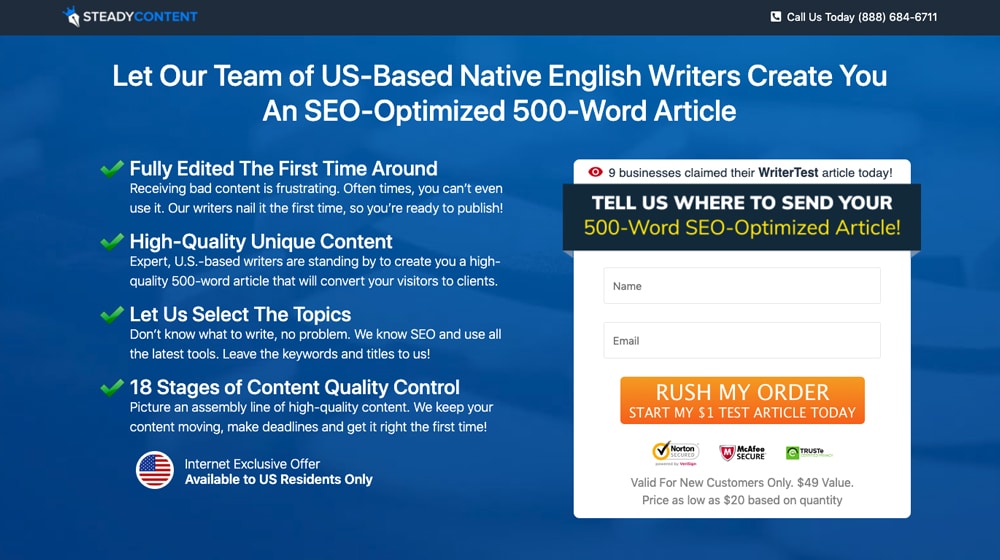
The bar was very low and easy to clear, and sites that could crank out thousands of 500-word blog posts were doing so successfully before being affected by algorithm updates and rising competition. That was almost a decade ago, and yet, this 500 word "gold standard" is still being tossed around. There are millions of articles that still reference it, even though this is a very outdated standard.
The Modern Word Count
So, what are blog posts looking like these days? If you take my posts, you see me write between 2,000 and 2,800 words on a regular basis, but I like to be competitive, and if I'm putting time into something, I want to look back at it and be proud of it. Could I get away with less? Maybe. Plenty of my posts often feel like I could cut a few paragraphs and they'd still be helpful and informative.
Late last year, I performed a research study. I scraped nearly 30,000 blog posts and analyze their length, ranking, and quality. You can read the full research study here, but I'll give you a summary.
From 2011 to 2015, shortly after Panda and the fallout of its constant adjustments, the most common lengths for blog posts were between 500 and 1,500 words. The most popular was around 990 - 1,100 words.
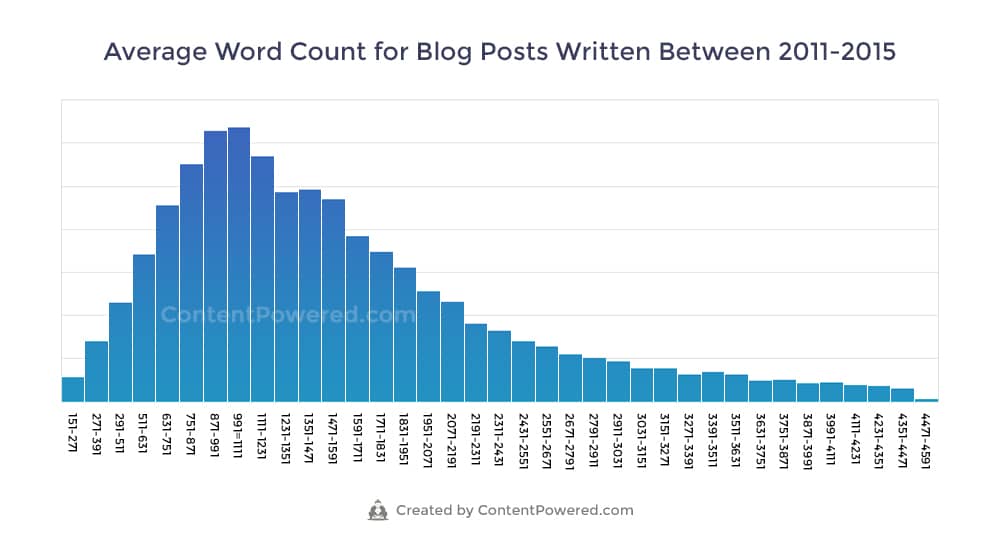
From 2019, the year of the study, we see that word counts have been gradually increasing. The 500-word post has been dropping off in popularity, and the average length has crept up. The most common length now is around 1,230 - 1,350 words.
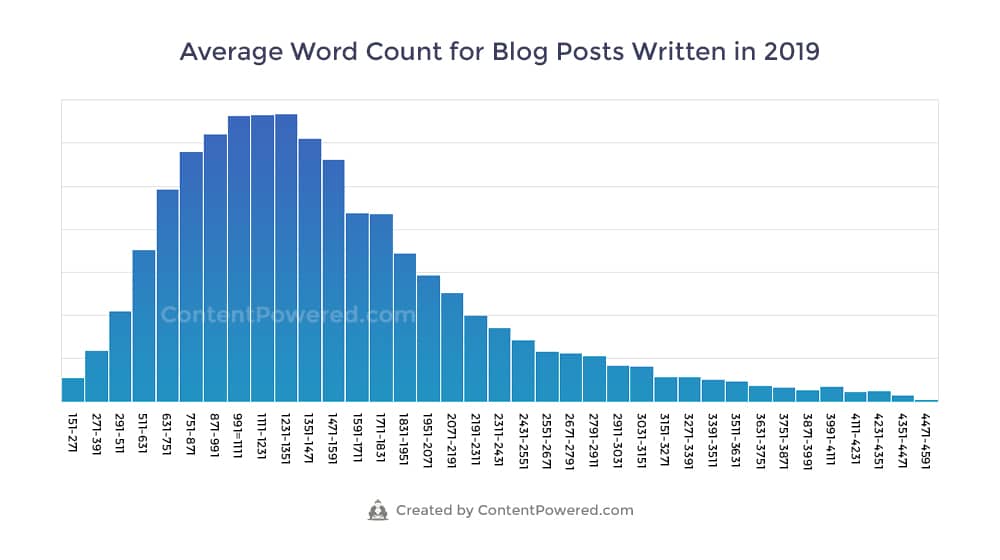
There's one potential confounding variable, which is simply that older posts may have been either updated or deleted. We're looking at survivorship bias; the fact that posts from 2011 are rarely under 500 words doesn't mean that posts back then weren't under 500. It means that the posts that survived are 500+. Anything less was dragging the site down and was deleted or improved. In order to get a real picture of what the internet was like back then, I'd need to use a huge historic index of Google ranking data for blog posts in 2011, which isn't exactly something that is easy or even possible to stumble across.
At any rate, our study showed that shorter content is becoming increasingly less common on the first few pages of Google, and that longform content is becoming more prevalant. How do you intend to compete with a 1,500 word blog post if you only wrote 500 words? What are the odds that their post covers things your post didn't cover?
Stronger Competition, Longer Content
To this day, I still have people ask me about ordering 500-word blog posts rather than my usual 2,000-word posts. And, sure, in some cases, they may still perform if their competition is low enough. You can still (occasionally) find 500-word articles in organic search results to this day. Here's the thing, though: all of that content falls into one of five categories.
- Posts on sites owned by people who have a powerful reputation already.
- Posts on sites that have massive SEO presences already.
- Posts on news sites with trending content that dies quickly.
- Posts that aren't performing well.
- Posts on very niche topics with little to no competition.
In fact, I challenge you to find me a website that publishes 500-word blog posts and doesn't meet one of those four criteria. It might take you a while.
The first group is smaller authority blogs; for example, the blog of Matt Cutts. Matt doesn't post very often, and when he does, his posts are short. His posts were only noteworthy because he was the then-head of Google's Web Spam division, and thus one of the prime authority figures for SEO directives. He didn't need to care about ranking; his posts would get circulation anyways, and he would rank simply on the power of the links people pointed at his blog. His site is, at the time of writing, a Moz Domain Authority 66, and ranking in the top 100,000 websites in the world on Amazon's Alexa.com analysis.
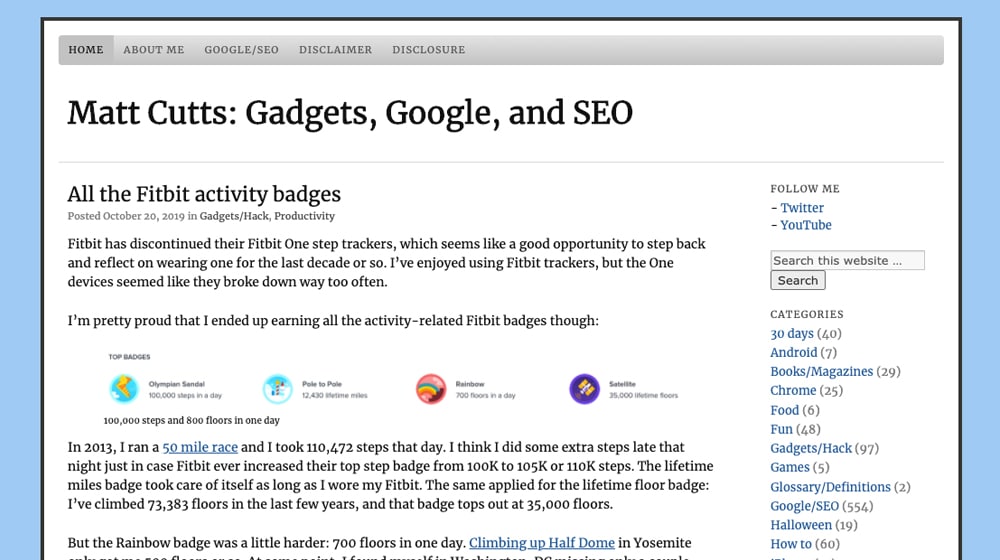
The second group is sites like, for example, Inc. Most of the posts on their site are based on evergreen topics in the 500-700-word range; not necessarily because that's the best word count, but because it doesn't matter. They cover a topic in brief, and it ranks because Inc is a massive site with millions of powerful backlinks, so of course it's going to rank. Forbes also does this. Inc is a household name and has a Moz Domain Authority of 92. There aren't many sites that are larger than that and can compete based on their domain authority.

The third group is news sites like, say, CNN. Most news sites post short articles covering a topic, with the occasional longer investigative report or opinion piece. They don't need longer posts because they're here to deliver the news, a handful of facts, and a bit of context, and that's about it. They don't care if the content ranks; it's not going to be relevant a week or a month from now anyway, and they will still appear in Google News and will float around social media for a few days. CNN.com is a Domain Authority 95.
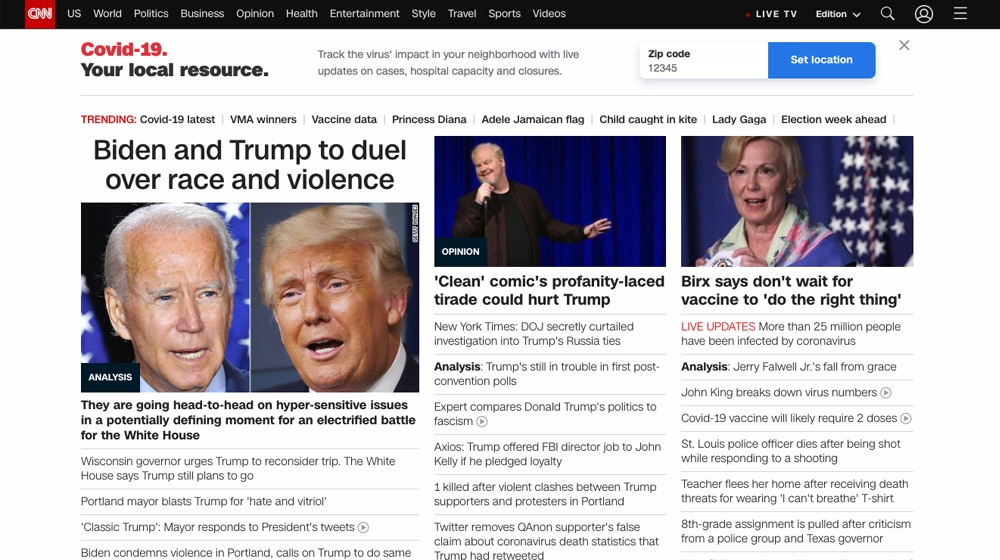
The fourth group is the rest of us, where writing a 500-word post might not tank our sites, but that post probably isn't going to rank very well compared to more in-depth posts. In fact, I have a challenge for you. If you're a site owner and you have a 500-word blog post that performs well (or used to), make it longer and add some extra value to it. I bet its traffic and performance will increase.
SMERush agrees, by the way. According to their study – with a much larger sample size than my own, and with much more data – there's this.:
"Longreads of 3000+ words get 3x more traffic, 4x more shares, and 3.5x more backlinks than articles of average length (901-1,200 words.)"
So, we've talked a lot about 500-word blog posts, but what about content that is 500 words on things like product descriptions or other internal pages?
Blog Posts Versus Page Content
There's a distinction I want to make here. I'm talking specifically about blog posts. I've had this discussion with people many times before, and I've had them submit evidence to me of webpages with 500 or fewer words on them that are, nevertheless, ranking well in Google.
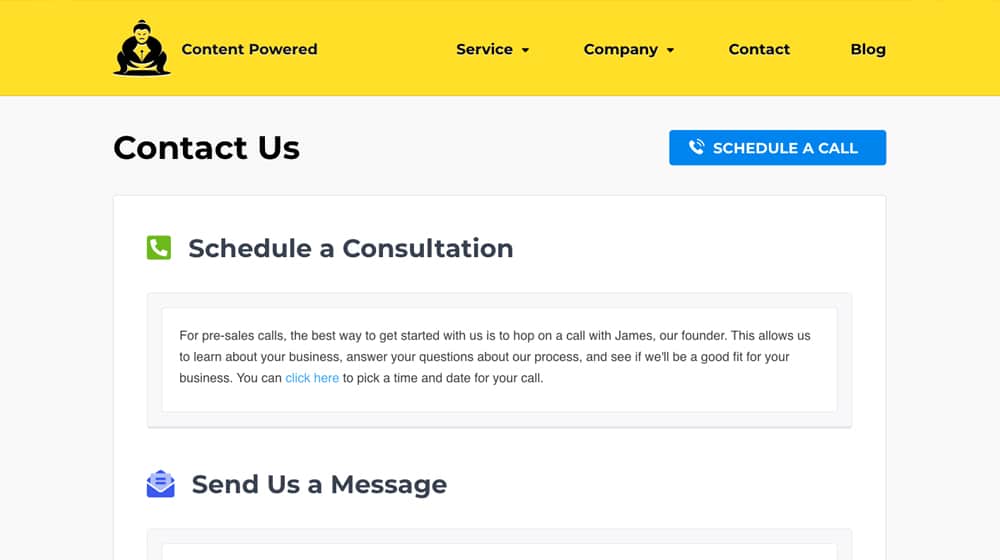
Do you know what all of these pages have in common? They aren't actually blog posts.
You can have a page with only 150 words of content on it, and it may rank well on Google. Product pages routinely have less content than that. Landing pages usually, though not always, have less content. Though, when you consider the value of pictures and video for user experience, word count isn't always the primary metric here.
There could be many different pages on your site that can perform their functions and rank well with low word counts. The difference is, blog posts are their own primary source of content. Their purpose is to be helpful and informative. Their strength is in their words. If you are barely skimming the surface and only helping a fraction of the people researching that topic, the page isn't very valuable to visitors or search engines.
Therein lies the problem of limiting yourself to a few paragraphs.
Attention Span and Content Skimming
There's one thing I think goes to explain why longer posts are better, and it's the way the average reader reads a blog post.
You may have heard before that people tend to skim blog posts rather than read them. You've also probably seen eye-tracking diagrams showing the F-shaped pattern their eyes travel. They read the headline, they read subheadings, and they read choice sentences or paragraphs that catch their attention.
So if readers are only skimming articles anyway, why write longer articles? If you write shorter posts, wouldn't a reader then choose to read the whole thing, since there's not much there?
The answer is, of course, no. They'll still skim it, they just have less to skim.

The key realization is not that they skim, it's why they skim. Think of it as a reference. Blog readers are typically coming to a blog post because they have a piece of information they want to learn, a question they want to be answered.
If you want to know what the primary exports of Vietnam are, you don't read the entire Wikipedia article on Vietnam from top to bottom, right? Of course not. You skim the article until you find the section on economics, then skim within it until you find exports, and then you read that section. That doesn't make the rest of the wiki article bad or useless, it just means it wasn't relevant to you at the time.
Blog posts are the same. They might not be as long or as in-depth as a Wikipedia article on a subject, but that's fine. You're not writing comprehensive articles on specific subjects all the time, and the times you do, those are flagship, pillar pieces of content. They're hugely evergreen and hugely valuable, just like Wikipedia articles.
When you write a longer blog post, you're covering different bases. You're using subheadings and other forms of organization – like lists and text formatting – to indicate the context and content of a given section or paragraph.
Readers arrive, and they do an initial skimming of the title and introduction paragraph to make sure your post is going to answer their question. Then they skim the article looking for the specific section talking about the subject they're interested in. When they find it, they read that article next.
The Broad Versus Narrow Dilemma
This brings up a problem in blogging that I often have to contend with. I blog on a regular schedule, and I'm sure all of you do as well. When you write long pieces of content, it's tempting to make it broad, to cover all the bases more like a wiki article, so it draws in all manner of traffic from people looking for specific information on the overall subject. These are broad articles, and they work great as pillar posts and resources.
The problem is, that kind of content can get unfocused, and unfocused content is harder for Google to rank appropriately. You might rank #3 for ten different queries, but another site that has ten different posts, one for each query, will rank better.
Broad content is often better for many readers, but narrow content is better for search engines. So, where do you draw the line?
What I do to solve the problem is to focus on linking internally to my other posts. I write longer posts on narrow subjects, and throughout the post, I touch on related subjects. Rather than go into detail about them, I link to other posts where I have. For example, in our guide on B2B blogging, we linked to 28 of our other posts in this guide where they were relevant.
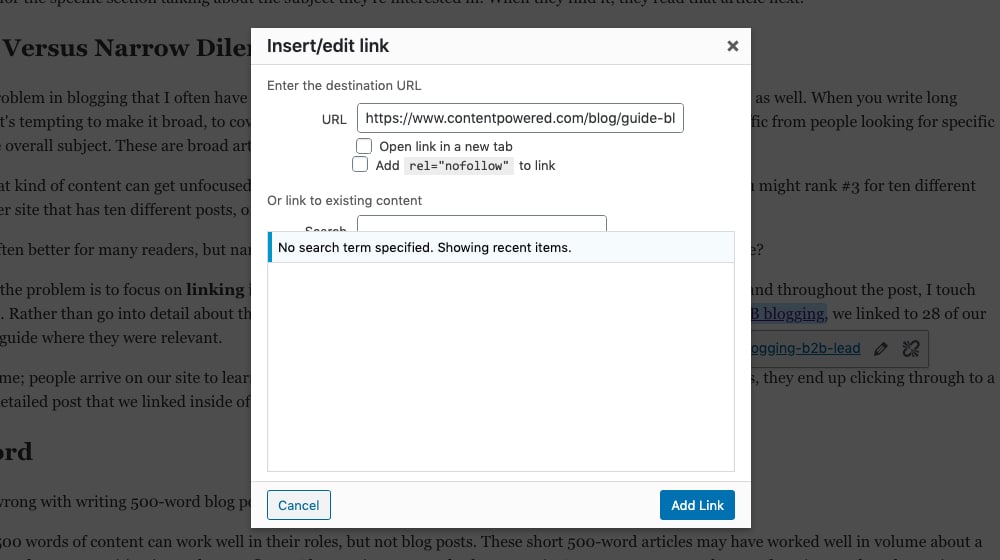
The effect is the same; people arrive on our site to learn about a topic, look for their information, find it, and leave. Sometimes, they end up clicking through to a deeper and more detailed post that we linked inside of our article.
A Final Word
Is there anything wrong with writing 500-word blog posts? I say yes.
Pages with under 500 words of content can work well in their roles, but not blog posts. These short 500-word articles may have worked well in volume about a decade ago, but these days, competition is much more fierce. If you write 500 words about a topic, I can guarantee you that another site out there has written 1,000 words or even 2,000 words on the same topic, and another site may be working on a 2,500-word post.
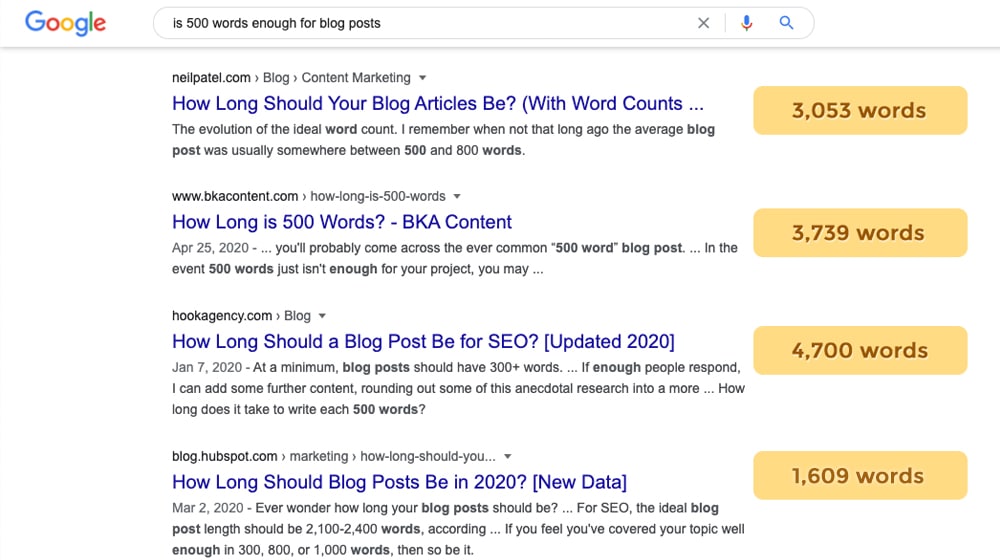
Which do you think search engines will favor as the most in-depth and helpful article?
A decade ago, 500 words articles were fine when the competition was 500 words or less. These days, competition averages 1,250 words and is often 1,500 words or more. It's not getting any easier to rank short posts, and really, there's only so much value you can cram into a few paragraphs.
Personally, it's no longer worth it to use this sort of "quantity over quality" approach. Keep your short content pages to product pages, landing pages, and system pages where longer word counts aren't as necessary. Don't obsess over word count too much, but don't try to do the bare minimum of 500 words, either. This "magic" word count was invented by marketers a long time ago, and it just isn't relevant or truthful anymore.
What do you think of 500-word blog posts? Are you having success with them? Do you disagree with anything in our post? We'd love to hear your thoughts in our comments section below!










September 04, 2020
I find that word count requirement for articles varies for different topics. Some need at least 2000 words, others need less while marketing articles need 3000+. You also need to consider other factors such as what kind of audience you have, your style, format, medium, frequency and substance. The 500 word article brings back a lot of memories though!
September 06, 2020
Hey Sara! Well said. Haha, that's a great one, I need to say that when my clients ask me if 500 word posts are enough: "Ahhh, 500 word articles, that brings me back...."
😂
November 09, 2020
I can't believe there are still blogs that have a 500-word count. With all the competition, I don't think it will rank well having that short of an article
November 09, 2020
Hey Paul, you're speaking to the choir! There are a lot of SEO best practices and strategies floating around that are over a decade old. I still hear people checking for keyword density, using article spinners, link pyramids, and other techniques that haven't worked in a long long time.
December 28, 2020
This sucks because so many of my articles from a few years back are around 500 to 1000 words. Should I just trash them? Frustrated that things change so fast.
January 04, 2021
Hi Brianna!
What I like to do for my clients in these situations is to perform a blog audit. Get a spreadsheet started with all of your posts that you'd like to review and check their Google Analytics traffic over the past 5+ years.
You should also use a paid tool like Ahrefs to check each one to see if it has any links and check on Google to see if each post is indexed.
Update your spreadsheet accordingly.
If it used to get traffic years ago and doesn't anymore, or if it has any links, it is a good candidate to be re-written.
If it never had any traffic or has a very small trickle of traffic to where it's basically insignificant (a few visitors per month), or if it's de-indexed, it's most likely a good candidate for deletion.
There's no harm in deleting posts that aren't getting any results, and usually, the other pages on your site will perform better after "cutting the fat" off your site, so to speak.
Just make sure you're thoroughly auditing them. External links are important, so Ahrefs is a must to see if they've picked up any quality links. You can also consider checking spelling and grammar with Grammarly, and for plagiarism with Copyscape.
It's always worth auditing your content like this. It takes time, but it's worth it in the end, trust me!
February 02, 2022
"They’ll still skim it, they just have less to skim." Wow, I haven't thought about it that way before. Now that you mention it, I realize I tend to do the same thing. No matter the length of the post, I find myself skimming it anyway. That being said, I agree, I think 500-word posts should only be for product pages or landing pages.
February 04, 2022
Hey Kim! Absolutely - this is why a table of contents is helpful too.
Users can jump to the relevant section and get what they're looking for right away.
Both users and search engines appreciate them!
August 28, 2022
Then why did you post an article with 2,915 words? You need more words than your competitors in my experience
September 01, 2022
Good eye! And I agree 🙂